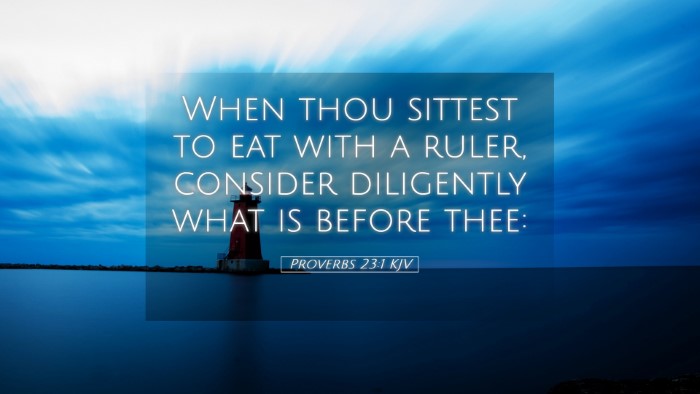Commentary on Proverbs 23:1
Proverbs 23:1 states: "When you sit down to eat with a ruler, consider diligently what is before you." This verse serves as an important reminder for self-awareness and prudence in social situations, especially when associated with those in positions of power or authority.
Context and Significance
This verse occurs within the context of wisdom literature, aimed at promoting ethical behavior and understanding among the readers. It is crucial for individuals, especially leaders and students of theology, to understand the implications of this proverb not only in personal conduct but also in the dynamics of societal relationships.
Insights from Matthews Henry
Matthew Henry emphasizes that sitting at the table of a ruler, as this verse signifies, is not merely a privilege but also a responsibility. He cautions that believers must be aware of the influence that a ruler's table may exert on their thoughts and behaviors.
- Caution in Dining: Henry suggests that when one is esteemed enough to sit with a ruler, they should evaluate their own heart and intentions. It is a call for self-examination before partaking in such associations.
- Understanding the Motives: Dining with a ruler may come with expectations or temptations. Believers must be vigilant about the motives that govern such meetings, ensuring their integrity remains intact.
- Reflecting on Choices: The verse invites reflection on dietary choices, symbolizing broader lifestyle choices and the consequences they carry.
Insights from Albert Barnes
Albert Barnes interprets this verse through a practical lens, emphasizing the need for discernment when engaging with influential personalities.
- Self-Restraint: Barnes points out that this verse encourages individuals to restrain themselves from gluttony and indulgence, specifically in the presence of those who may have different values.
- The Importance of Thoughtfulness: He underlines the significance of being mindful about one's actions and decisions. The act of eating with a ruler should be approached with discretion and wisdom, suggesting a deeper introspection about one's values.
- Evaluating Surroundings: Barnes highlights the importance of being aware of one's social surroundings and the influences that come with them, promoting a careful selection of companions.
Insights from Adam Clarke
Adam Clarke’s commentary provides a theological perspective that intersects with the practical advice of this verse, reflecting on its implications for Christian living.
- Spiritual Awareness: Clarke emphasizes that this proverb calls believers to be spiritually sensitive when engaging with individuals in authority. The phrase "consider diligently what is before you" refers not only to the food but also to the attitudes and values represented at the table.
- Warning Against Materialism: He warns against the potential trap of materialism, advising readers to prioritize spiritual nourishment over worldly gain or pleasure.
- Fostering Integrity: Clarke encourages the cultivation of integrity and conscious decision-making, asserting that associating with rulers should not compromise an individual’s principles and convictions.
Applications for Pastors and Theologians
The message of Proverbs 23:1 serves as a pertinent lesson for pastors, theologians, and students of Scripture. Here are some applications derived from the combined insights of the noted commentators:
- Self-Examination: Pastors should encourage their congregations to regularly assess their intentions and values, particularly in contexts where external influences may pressure them to conform.
- Teaching on Influence: Theological education can incorporate discussions about the nature of influence and authority in Christian life, linking practical wisdom with spiritual disciplines.
- Ethical Engagement: Leaders in faith communities must model how to engage thoughtfully with influential figures, emphasizing that Christian conduct must remain rooted in ethical integrity regardless of social contexts.
Conclusion
Proverbs 23:1 encapsulates profound wisdom regarding self-awareness and moral integrity. The combined perspectives of Matthew Henry, Albert Barnes, and Adam Clarke underline the necessity of caution and reflection when placed in the company of authority. For students, theologians, and pastors, this verse serves as an admonishment to navigate relationships within the sphere of influence wisely, ensuring that one's spiritual and ethical commitments are upheld.


